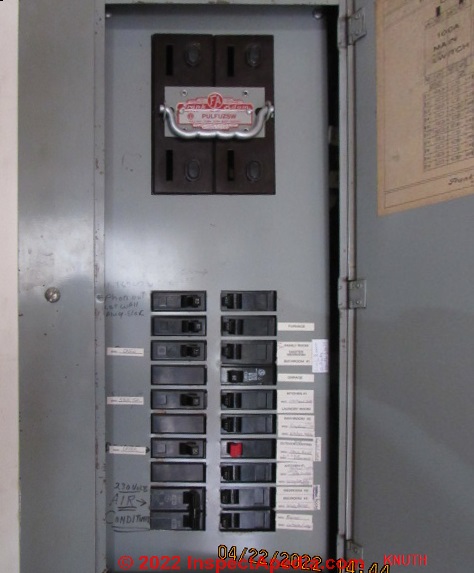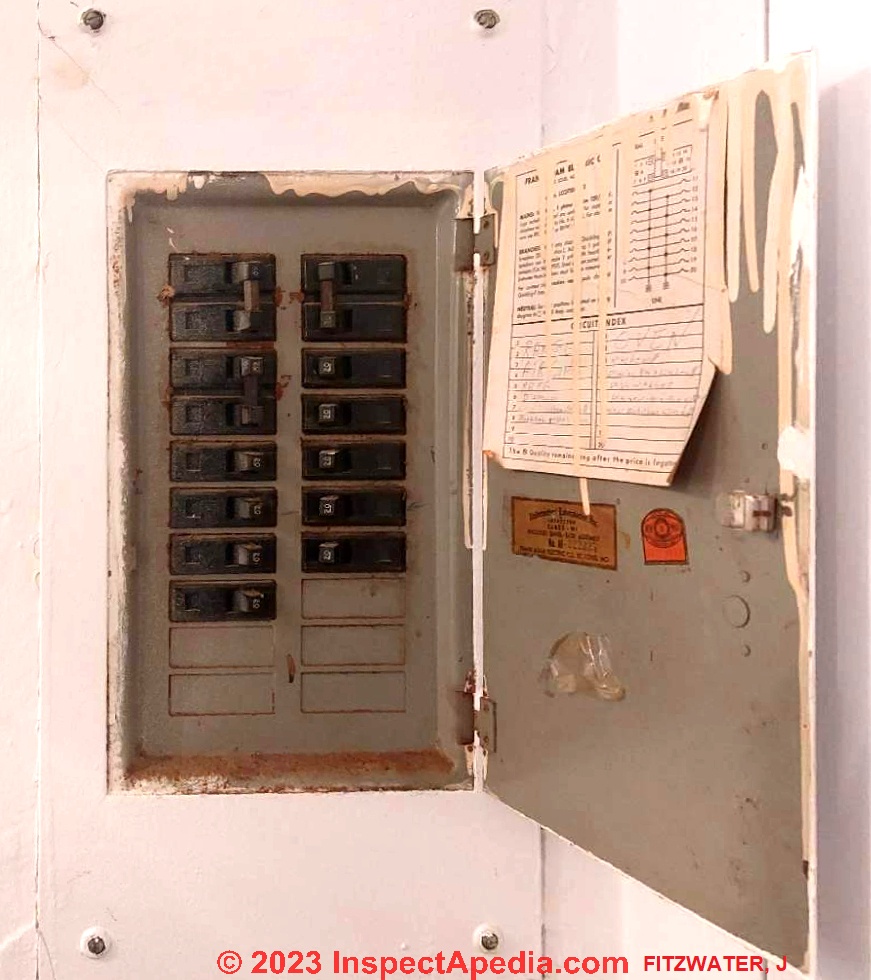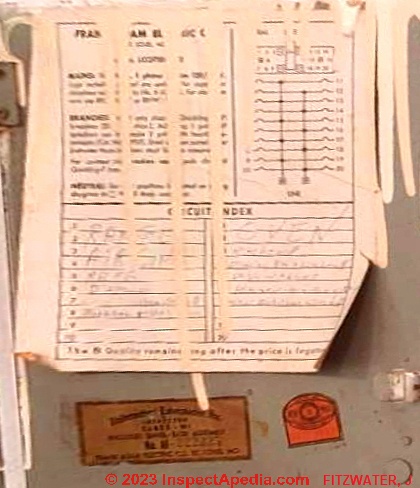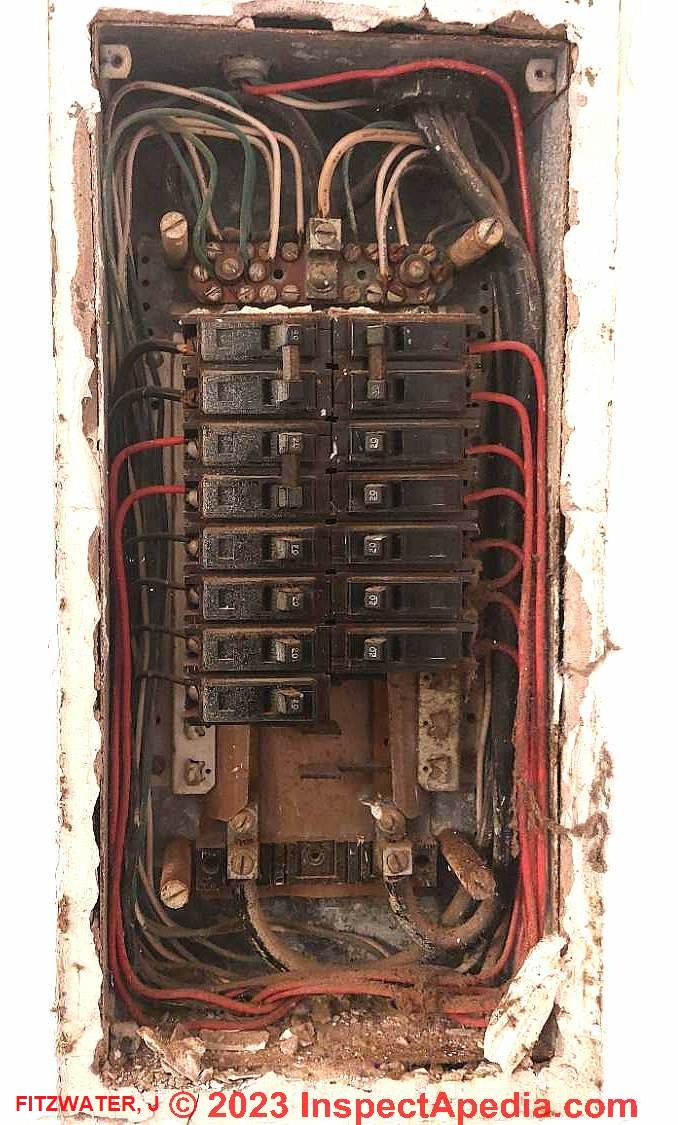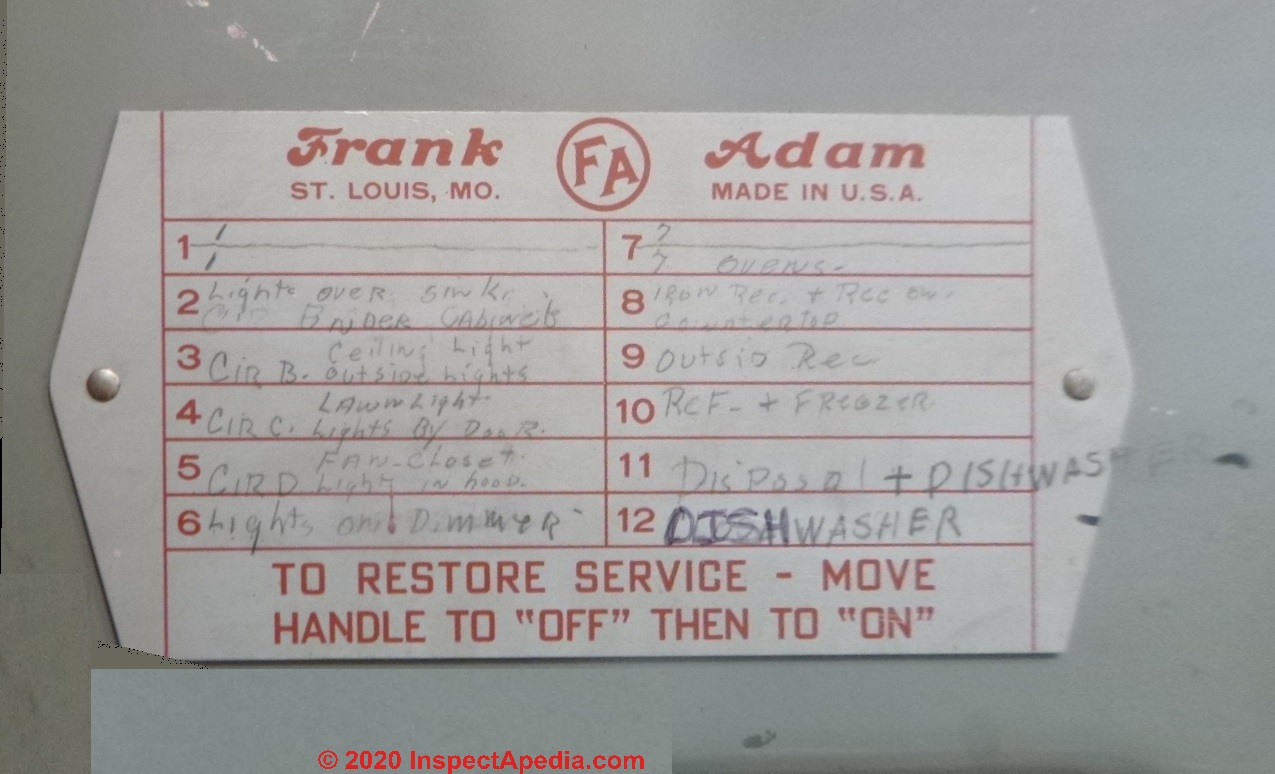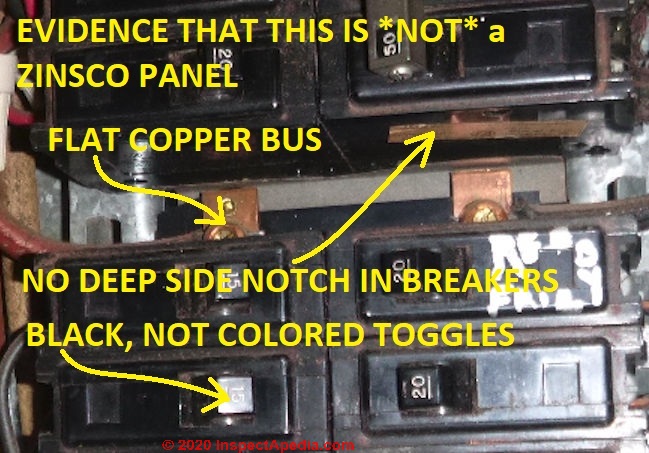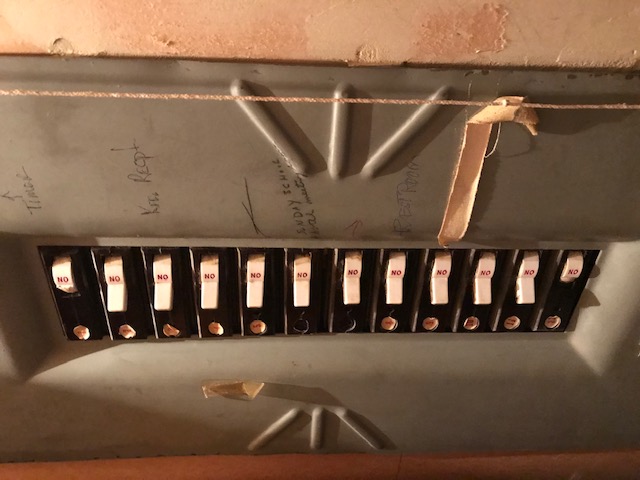 Frank Adam Electrical Panel Hazards
Frank Adam Electrical Panel Hazards
Frank Adam's Panel History, Hazards, Breaker Failure Rates
- POST a QUESTION or COMMENT about Frank Adam Electrical Panel Safety, buying, repairing, replacing Zinsco electrical panels & parts
Example photos of Frank Adam panels, a split bus panel design, and Frank Adam panel identification labels.
This Frank Adam electrical panel article gives the history of the Frank Adam electrical company and also discusses the electrical, fire, and shock hazards associated with Frank Adam electrical components, circuit breakers, electrical panels, including the incorporation of Frank Adam and Zinsco circuit breaker design and components.
Page top photo: an older Frank Adam electrical panel still in use in a U.S. home.
InspectAPedia tolerates no conflicts of interest. We have no relationship with advertisers, products, or services discussed at this website.
- Daniel Friedman, Publisher/Editor/Author - See WHO ARE WE?
Frank Adam Electrical Panels & Advice for Homeowners and Home Buyers
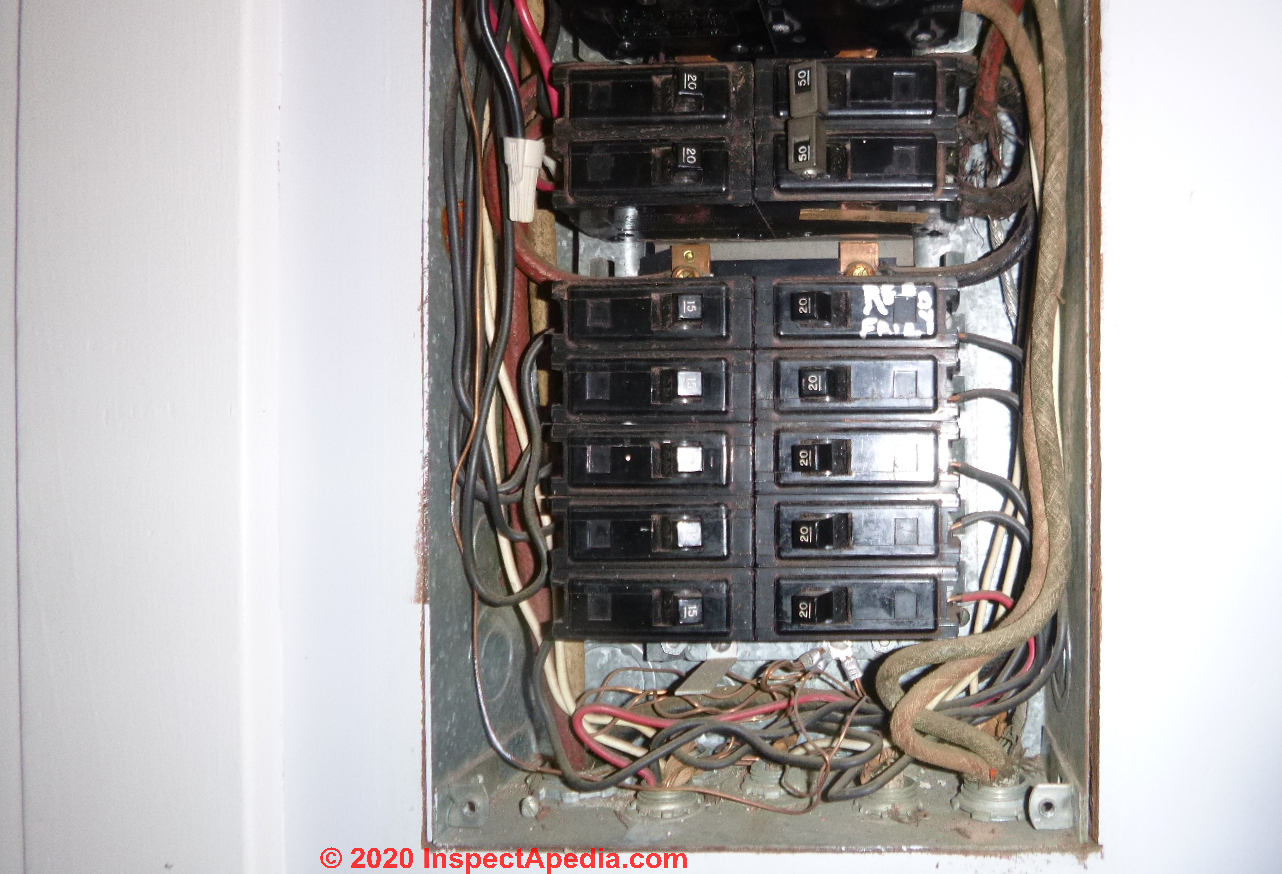 Frank Adam electrical panels, shown here, do not offer
the level of overcurrent and fire protection provided by most other electrical panels and circuit breakers.
Frank Adam electrical panels, shown here, do not offer
the level of overcurrent and fire protection provided by most other electrical panels and circuit breakers.
Independent test results show that Frank Adam circuit breakers had a significantly higher failure rate than most other electrical panel brands.
Photo: a split-bus Frank Adam electrical panel, courtesy Larry Transue.
[Click to enlarge any image]
In addition to the circuit breaker failure rates in Frank Adams panels, at least some Frank Adam electrical panels are of the split bus design, as illustrated later in this article in a photo courtesy of ASHI inspector Larry Transue and other home inspectors (cited below).
A "split bus" electrical panel is one in which circuit breaker connections are configured so that a group of breakers in the upper panel include one or more that provides power to an electrical bus in the lower half of the electrical panel. In other words, there may not be a single "main breaker" that will turn off all electrical power.
Using a different brand (Cutler Hammer), the safety concern with split bus panels is detailed
at SPLIT BUS ELECTRICAL PANEL HAZARDS
Watch out: OPINION: we do not recommend installing "replacement" Zinsco circuit breakers as there some indications that the performance and safety of those devices may be poor.
Frank Adam Electrical Panel & Breaker Failure Rate Test Results
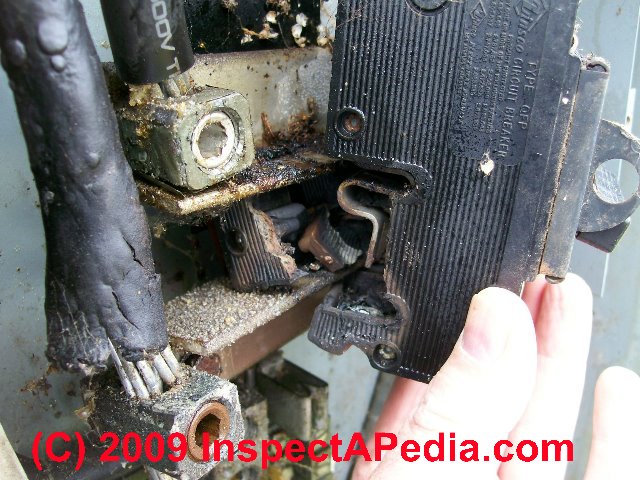 Limited test results reported by Dr. Jess Aronstein indicate that the central Zinsco electrical panel and circuit breaker failure problem appears to be burn ups at the clip-to-bus connections such as shown in our photo of a burned Zinsco electrical panel bus and breaker.
Limited test results reported by Dr. Jess Aronstein indicate that the central Zinsco electrical panel and circuit breaker failure problem appears to be burn ups at the clip-to-bus connections such as shown in our photo of a burned Zinsco electrical panel bus and breaker.
A circuit breaker whose bus connection burns can lead to overheating damage to the circuit breaker itself, rendering it non-functional.
For a summary of Frank Adam, Zinsco and UBI-Zinsco-Replacement circuit breaker test results to date,
see ZINSCO CIRCUIT BREAKER TEST REPORT - separate article.
Also see ZINSCO FAILURE REPORTS where we indicate that nearly 32% of the Zinsco circuit breakers tested to date failed to trip as required by the UL testing standard. A very small sample of UBI-brand replacement circuit breakers for Zinsco panels also failed to trip.
Photo at page top of a burned and failed Zinsco main circuit breaker, courtesy of J. P. Simmons - Mr. Electric. Simmons adds: "In this case the failure damaged the main wire to a mobile home also (you can see the melted wire to the left of the main).
This is a good example of why I do not like to see anyone remove these breakers. You can not tell how bad they are damaged by looking at them.
With the exception of the more seriously failing FPE Stab-Lok electrical panels, we have not received any significant number of field failure reports concerning other electrical panel brands that also use aluminum parts and that are or were priced in the same range as Zinsco.
This means homes with this equipment may be at greater risk of fire or other electrical hazard.
Frank Adam Electrical Panel Replacement Recommended?
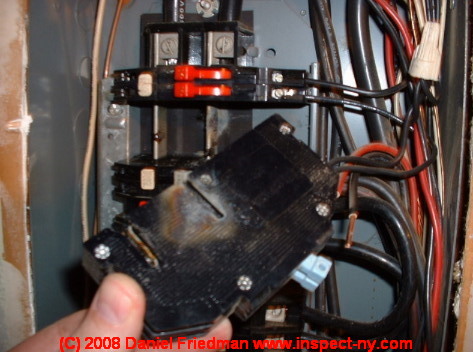 Where a Frank Adams electrical panel uses Zinsco-type circuit breakers is in use, arcing, contact-point burn,
and even circuit breaker case blow-out have been observed in the field.
Where a Frank Adams electrical panel uses Zinsco-type circuit breakers is in use, arcing, contact-point burn,
and even circuit breaker case blow-out have been observed in the field.
We do not have statistically solid data that supports an unequivocal argument to replace Zinsco electrical panels.
OPINION: However, based on field reports to-date and preliminary tests, where these electrical panels are discovered in buildings a homeowner should consider replacing the panel to reduce fire and shock hazards and owners should be careful to avoid overloading their electrical circuits where this equipment is installed.
Building owners or electricians encountering problems with this equipment are asked to contact us to add that information to our electrical failure data base in an effort to develop accurate safety information which is then shared with appropriate federal and state agencies.
Thanks to Mr. James Simmons, a licensed electrician with extensive field experience and the contributor of most of the photos and case reports at this web page.
Our photo (above left) illustrates a burned-up electrical receptacle whose circuit was protected by a Zinsco-design circuit breaker that failed to trip and in fact had burned itself in the panel.
Frank Adam Electrical Panel History, Age, Dates & Patents for Zinsco Electrical Panels & GTE-Sylvania Zinsco Electrical Panels
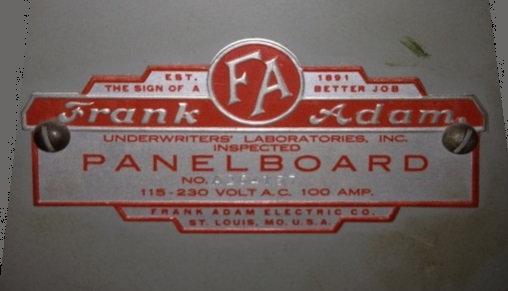 [Citations needed, use the page bottom CONTACT link if you can provide additional data - Ed.]
[Citations needed, use the page bottom CONTACT link if you can provide additional data - Ed.]
This article series discusses the electrical, fire, and shock hazards associated with Zinsco electrical components, circuit breakers, electrical panels, including certain Sylvania electrical panels and breakers which are in fact of the same product design and origin. Zinsco-type QSF electrical panel circuit breakers may also appear in Frank Adam Electric Panelboards.
The following history giving key dates in the history of Frank Adam electrical panels is excerpted from a more-detailed history given
at ZINSCO SYLVANIA ELECTRICAL PANELS
That the presence of Frank Adams, the Frank Adam electric company, and its employees were a major factor in the development of electrical panels is evident in the list of patent disclosures and other documents we list just below, starting in 1891.
- 1891 Frank Adam Electrical Panels
Frank Adams Electrical panels were installed in buildings in the U.S. roughly between 1900 and 1950, possibly as late as 1970. Contact us if you have photos of a Frank Adams electrical panel or other details.
Frank Adam Electric, founded in 1891 in St. Louis MO, descended from a watch and surveying equipment manufacturer, Blacker and Adam Watch Co.
Emile Zinsmeyer, founder of what later became Zinsco Electric, was employed at Frank Adam's retail sales, moving to California in the 1920's to operate Frank Adams business there.
Zinsmeyer purchased Adams' stock in California in 1929, founding Zinsmeyer Co. with family members and continuing to operate in California. - Source: Historical report indicates that Frank Adam Electric, formed in 1891, operated on the U.S. west coast. - Heather Hill to Mike Holt, note posted at Mike's forum, no longer on-line (2018).
Frank Adam Electric Co. continued to operate, as indicated in some of the patent citations we include below showing inventions assigned to Frank Adam Electric Co. ranging from 1906 to at least 1965.
- 1903: Adams, Frank. "Electric canal system." U.S. Patent 728,823, issued May 26, 1903.
- 1905: Adams, Frank. "Electric railway." U.S. Patent 807,984, issued December 19
- 1906, Adam, Frederick B., Service Entrance Box, U.S. Patent 851726, issued April 30, 1906, assigned to Frank Adam Electric Co.
- 1912, Adam, Fredrick B. "Fastening device for panel-board cabinets." U.S. Patent 1,027,397, issued May 28, 1912.
- 1912, Adam, Fredrick B. "Bus-bar-connecting device." U.S. Patent 1,030,798, issued June 25, 1912.
- 1918, Adam, Fredrick B. FLOOR BOX [PDF] U.S. Patent 1,254,641, issued January 22, 1918.
- 1931, Stieglitz, Henry M. "Clamp." U.S. Patent 1,793,261, issued February 17, 1931.
- 1932, Stieglitz, Henry M. "Catch lock." U.S. Patent 1,877,612, issued September 13, 1932.
- 1933, Adam, Frederick B. PANEL BOARD and CABINET [PDF] U.S. Patent 1,930,028, issued October 10, 1933.
- 1934, Green, Floyd S. "Circuit interrupting and protecting apparatus." U.S. Patent 1,966,716, issued July 17, 1934.
- 1936, Adam, Frederick B. "Electrical outlet box." U.S. Patent 2,033,602, issued March 10, 1936.
- 1936, Frank, William H., and Joseph W. Harper. "Electrical distribution system." U.S. Patent 2,059,986, issued November 3, 1936.
- 1939, Adam, Frederick B. "Electric heater." U.S. Patent 2,162,341, issued June 13, 1939.
- 1939, Adam, Frederick B., and Floyd S. Green. "Arc quencher." U.S. Patent 2,159,645, issued May 23, 1939.
- 1940, Adam, Frederick B., and Henry M. Stieglitz. "Circuit interrupting and protecting device." U.S. Patent 2,186,813, issued January 9, 1940.
- 1940, Adam, Frederick B. "Bus duct." U.S. Patent 2,216,870, issued October 8, 1940.
- 1942, Adam, Frederick B., US2424909 CIRCUIT INTERRUPTING DEVICE [PDF] Assignee: Frank Adam Electric Co, original source: http://www.google.com.mx/patents/US2424909
- 1943 Zinsco Electric formed: Martin Zinsmeyer purchased the Zinsmeyer company from his father, renaming it Zinsco Electrical Company as appears in the various patents.
- 1943, Adam, Frederick B. "Bus duct." U.S. Patent 2,310,919, issued February 16, 1943.
- 1943, Stieglitz, Henry M. "Hinged cover for electrical apparatus." U.S. Patent 2,324,738, issued July 20, 1943.
- 1943, Green, Floyd S. "Enclosed switch." U.S. Patent 2,332,633, issued October 26, 1943. Application filed by Frank Adam Electric Co.
- 1944, F.S. Green, US2439511 LATCHING or TRIPPING MECHANISM of CIRCUIT BREAKERS [PDF] Assignee, Frank Adam Electric Co
- 1944, Stieglitz, Henry M. "Method of forming solderless connectors." U.S. Patent 2,358,745, issued September 19, 1944. . Application filed by Frank Adam Electric Co.
- 1945, Adam, Frederick B. "Operating mechanism for toggle type switches and circuit breakers." U.S. Patent 2,368,083, issued January 30, 1945.
- 1947, Adam, Frederick B., Floyd S. Green, and Henry M. Stieglitz. "Circuit interrupting device." U.S. Patent 2,424,909, issued July 29, 1947.
- 1947, Green, Floyd S. "Switch clip." U.S. Patent 2,433,115, issued December 23, 1947.
- 1948, Frank, Adam, and Floyd S. Green. CIRCUIT BREAKER [PDF] U.S. Patent 2,435,114, issued January 27, 1948.
- 1948, Green, Floyd S. LATCHING or TRIPPING MECHANISM of CIRCUIT BREAKERS [PDF] U.S. Patent 2,439,511, issued April 13, 1948.Green, Floyd S. "Latching or tripping mechanism of circuit breakers." U.S. Patent 2,439,511, issued April 13, 1948.
- 1949, Frank, Adam. "Bus duct." U.S. Patent 2,482,310, issued September 20, 1949.
- 1951, Green, Floyd S. "Panel board." U.S. Patent 2,576,396, issued November 27, 1951.
- 1955, Stieglitz, Henry M. "Bus duct and branch circuit connector for power distribution systems." U.S. Patent 2,720,632, issued October 11, 1955. Application filed by Frank Adam Electric Co.
- 1951, Green, Floyd S. "Panel board." U.S. Patent 2,576,396, issued November 27, 1951.
- 1954, Stieglitz, Henry M. "SWITCH-OPERATING MECHANISM INTERLOCK p[PDF] U.S. Patent 2,674,666, issued April 6, 1954.
Photo: A Frank Adam PULFUZSW electrical panel in a 1956 Indiana home, showing a fused main current overload protection dev ice above its two columns of circuit breakers.
Photo courtesy of Fort Wayne, Indiana home inspector Eugene Knuth @ EKnuth.homeinspections@gmail.com Tel: 260-385-2536
- 1956, Frank, Adam. "Wire duct." U.S. Patent 2,762,398, issued September 11, 1956.
- 1957, Stieglitz, Henry M. "Panel boards." U.S. Patent 2,800,613, issued July 23, 1957.
- 1957, Green, Floyd S. CIRCUIT BREAKERS [PDF] U.S. Patent 2,810,803, issued October 22, 1957.
- 1961, Ellegood, Pruett W. "Distribution switchboard." U.S. Patent 2,997,627, issued August 22, 1961. Application filed by Frank Adam Electric Co.
- 1961,Lewis, Harold A. "Plug-in busduct." U.S. Patent 2,992,401, issued July 11, 1961. Application filed by Frank Adam Electric Co.
- 1964: photos below of Frank Adams electrical panels installed in a six story condominium built in 1964 in Satellite Beach Florida, provided courtesy of Double Scope Inspections
Palm Bay, FL
321-250-5344
Web: doublescopeinspections.com
- Satellite Beach is a coastal city in Brevard County, Florida.
Notice that there is no main circuit breaker in these electrical panels and that unless such a switch is quite close-by they violate the "rule of six".
Given that the inspector found these Frank Adams panels we both suspected that most of the other condos in that building have the same unreliable electrical panel.
- 1965: Hercules, L.A., FRANK ADAM ELECTRIC CO, 1965.
Enclosed switch with defeatable door interlock. U.S. Patent 3,188,410. Assigned to Frank Adam Electric Co.
2011 - 2012: Owner of counterfeit FPE & Zinsco circuit breaker company fined & sentenced to jail
BUSINESS OWNER PLEADS GUILTY TO TRAFFICKING IN COUNTERFEIT CIRCUIT BREAKERS [PDF] - source: U.S. Immigration and Customs Enforcement, retrieved 2018/05/02, original source
Elod Tamas Toldy, owner of Pioneer Breaker and Control Supply sentenced to federal prison for mail fraud and trafficking in counterfeit goods and services for marketing COUNTERFEIT CIRCUIT BREAKERS on eBay [PDF], under the brand names Zinsco and FPE Stab-Lok. - source: U.S. Immigration and Customs Enforcement, retrieved 2018/05/02, original source https://www.ice.gov/news/releases/texas-business-owner-sentenced-counterfeit-circuit-breaker-scheme - ICE Office of Public Affairs at (202) 732-4242.
Members of the public can report suspected counterfeit operations by calling the U.S. Homeland Security Investigations HSI’s toll-free hotline at: 866-347-2423.
- 2012 Zinsco Red-Tagged in Napa: 20 June 2012, City of Napa, California requires replacement of Zinsco Main Service Panels
To: Solar Photovoltaic Installers and Mechanical Contractors
From: Dan Kavarian, Interim Building Official
Date: June 20, 2012
RE: Required Service Changes for New Solar or Any Other New Appliance Installations
Effective immediately the City of Napa Building Division will require a service upgrade for any Solar Photovoltaic or Any New Appliance installation (i.e. furnace/ac) where the main service is a Zinsco Manufactured meter main.
Due to complications from these service panels in the past and the difficulties acquiring new breakers for future circuits, we have come to the conclusion that we will no longer support the use of these panels in this type of application.
At time of plan submittal the manufacturer of the service main must be shown on the plans and approved prior to permit issuance. If there is an existing Zinsco meter main, you will then be asked to contact PG&E to obtain a service planning request.
All service upgrades must have PG&E approval and be tagged by us prior to reconnect. Your permit will not receive a final inspection if this is an outstanding issue.
Any service upgrades done without PG&E approval will be "RED TAGGED" and the project will be put on hold. If the inspector performs and inspection on your project and a Zinsco meter main is in place and is not identified on the plans, the job will also be stopped and a "RED TAG" will be issued and you will be held responsible for all penalties charged. - REQUIRED SERVICE CHANGES for NEW SOLAR or ANY OTHER NEW APPLIANCE INSTALLATIONS - ZINSCO RED-TAG Source: City of Napa, 1600 First St., PO B 660, Napa CA 94559, 20 June 2012 - 2018: Jesse Aronstein 1, (Life Senior Member, IEEE), & David W. Carrier 2 MOLDED CASE CIRCUIT BREAKERS - SOME HOLES IN THE ELECTRICAL SAFETY NET [PDF] Received December 4, 2017, accepted January 24, 2018, date of publication February 7, 2018, date of current version March 15, 2018. Digital Object Identifier 10.1109/ACCESS.2018.2803298 1 Consulting Engineer, Schenectady, NY 12309, USA, 2 SUNY Dutchess Community College, Poughkeepsie, NY 12601, USA, Corresponding author: Jesse Aronstein (AronsteinJ@verizon.net)
...
Reader Comments, Questions & Answers About The Article Above
Below you will find questions and answers previously posted on this page at its page bottom reader comment box.
Reader Q&A - also see RECOMMENDED ARTICLES & FAQs
Photos of Frank Adam Split Bus Electrical Panel & ID Label
Special thankyou to professional home inspector Lawrence Transue for these photos of a Frank Adam Split Bus electrical panel and of the Frank Adam panel identification label.
This Frank Adam panel was found in a Stewartsville NJ home constructed around 1760, thus giving range to several generations of history of devices used in the home's electrical service.
Below: an identification label in this Frank Adam electrical panel, perhaps from the 1960s.
Mr. Transue is a technical content contributor to InspectApedia.com.
Evidence that this Frank Adam electrical panel does Not use Zinsco-Design Breakers:
Watch out: see details of potential hazards of split bus electrical panels
at SPLIT BUS ELECTRICAL PANEL HAZARDS
See details about Frank Adam Electrical panels and their role in the Zinsco history beginning remarkably in 1891 and extending at least to 1965, found
at HISTORY of ZINSCO ELECTRICAL PANELS
The failure rate of Frank Adam circuit breakes is detailed
at CIRCUIT BREAKER RELIABILITY TESTS
Lawrence Transue is a Pennsylvania building scientist and consultant, a certified ASHI home inspector, a Licensed Pesticide Applicator, a BPI Building Analyst & Envelope Professional, with 18 Years of Home Inspection Experience. He can be reached by Telephone: 610.417.0763, by Email: lawrence@lawrencetransue.com as well as at his WEBSITE and at FACEBOOK
Question: Identify this Electrical Panel: Frank Adam Electric Co. Brand
Can you identify the panel brand shown in the attachment? - JW by private email 2019/06/12
Moderator reply: Frank Adam panel, possibly using Zinsco breakers
I have not seen that emossed-front electrical panel, JW but I suspect it's a 1940's or 1950's era product.
Let's both research to see what we can find, perhaps trying a Google Image Match search. A logo or an internal label in the panel enclosure will be definitive.
I'll look further through my examples to see if I can spot anything similar.
Were you able to pull the panel cover to see if they were any labels inside? I also like the two broken toggle switches. Do we know anything about the age and location of the building where the panel is installed?
Watch out: those white colored toggle switches and long narrow breakers may be evidence that this Frank Adam panel uses Zinsco-design circuit breakers that are unsafe.
Ask your electrician to take a closer look at the circuit breakers in your panel and to compare them with this photo:
See details at ZINSCO CIRCUIT BREAKER TEST REPORT
Reader Follow-up:
Found the answer to the panel inquiry if you are interested. See below:
Above: logo on a Frank Adam panelboard, Frank Adam Electric Co., St. Louis MO, USA
Watch out: intersting to readers who owned hazardous Zinsco electrical panels, we have this historical note from Wikipedia's Zinsco entry:
Frank Adam Electric, a manufacturer of electrical panels and circuit breakers, was founded in 1891 as part of the Blacker and Adam Watch Company in St. Louis, Missouri. ... In 1943, Martin bought the company from his father and renamed it Zinsco Electric.
...
Continue reading at GTE-SYLVANIA-ZINSCO FAILURE MECHANISM or select a topic from the closely-related articles below, or see the complete ARTICLE INDEX.
Or see these
Recommended Articles
- CIRCUIT BREAKER FAILURE RATES
- CIRCUIT BREAKER RELIABILITY TESTS
- ZINSCO SYLVANIA ELECTRICAL PANELS - home
- GTE-SYLVANIA-ZINSCO FAILURE MECHANISM
- GTE-SYLVANIA-ZINSCO FAILURE REPORTS
- IDENITFY FRANK ADAM ELECTRICAL PANELS
- IDENTIFY GTE SYLVANIA-ZINSCO PANELS
- IDENTIFY KEARNEY PANELS
- IDENTIFY SYLVANIA ELECTRICAL PANELS
- IDENTIFY WALKER ELECTRICAL PANELS
- IDENTIFY ZINSCO ELECTRICAL PANELS
- SPLIT BUS ELECTRICAL PANEL HAZARDS
- ZINSCO CIRCUIT BREAKER INDEPENDENT TESTS
- ZINSCO CIRCUIT BREAKER TEST REPORT
- ZINSCO REPLACEMENT PANELS
- ZINSCO SAFETY PRECAUTIONS
Suggested citation for this web page
FRANK ADAM ELECTRICAL PANELS at InspectApedia.com - online encyclopedia of building & environmental inspection, testing, diagnosis, repair, & problem prevention advice.
Or see this
INDEX to RELATED ARTICLES: ARTICLE INDEX to ELECTRICAL INSPECTION & TESTING
Or use the SEARCH BOX found below to Ask a Question or Search InspectApedia
Ask a Question or Search InspectApedia
Try the search box just below, or if you prefer, post a question or comment in the Comments box below and we will respond promptly.
Search the InspectApedia website
Note: appearance of your Comment below may be delayed: if your comment contains an image, photograph, web link, or text that looks to the software as if it might be a web link, your posting will appear after it has been approved by a moderator. Apologies for the delay.
Only one image can be added per comment but you can post as many comments, and therefore images, as you like.
You will not receive a notification when a response to your question has been posted.
Please bookmark this page to make it easy for you to check back for our response.
IF above you see "Comment Form is loading comments..." then COMMENT BOX - countable.ca / bawkbox.com IS NOT WORKING.
In any case you are welcome to send an email directly to us at InspectApedia.com at editor@inspectApedia.com
We'll reply to you directly. Please help us help you by noting, in your email, the URL of the InspectApedia page where you wanted to comment.
Citations & References
In addition to any citations in the article above, a full list is available on request.
- [1] Personal communication, J. Aronstein to D. Friedman, 3/6/2006.Dr. Jess Aronstein, protune@aol.com is a research consultant and an electrical engineer in Schenectady, NY. Dr. Aronstein provides forensic engineering services and independent laboratory testing for various agencies. Dr. Aronstein has published widely on and has designed and conducted tests on aluminum wiring failures, Federal Pacific Stab-Lok electrical equipment, and numerous electrical products and hazards. See Aluminum Wiring Bibliography and see FPE HAZARD ARTICLES, STUDIES for examples.
- [2] James P. Simmons: Personal communication and photographs used in this article series, J. Simmons to Daniel Friedman, 3/4/2006, 2/19/2008. Photographs contributed to this website by Jim P. Simmons, Mr. Electric, Licensed Master Electrician, 1320 Dayton Street SE, Olympia, WA 98501, 360-705-4225, Fax 360-705-0130 or by email to mrelectricoly@msn.com
- [3] Thanks to various electricians, home owners, and home inspectors for contributing the Zinsco Sylvania-Zinsco electric panel and circuit breaker field failure reports cited above.
- [6] Thanks to Texas electrician Jeff Weissman for contribution of photographs of burned Zinsco circuit breakers. 03/06/2007. Mr Weissman can be reached at jeffweissman@gmail.com or by telephone at 713-666-6605 intenance Enewsletter @ AFullHouseInspection.com -->
- In addition to citations & references found in this article, see the research citations given at the end of the related articles found at our suggested
CONTINUE READING or RECOMMENDED ARTICLES.
- Carson, Dunlop & Associates Ltd., 120 Carlton Street Suite 407, Toronto ON M5A 4K2. Tel: (416) 964-9415 1-800-268-7070 Email: info@carsondunlop.com. Alan Carson is a past president of ASHI, the American Society of Home Inspectors.
Thanks to Alan Carson and Bob Dunlop, for permission for InspectAPedia to use text excerpts from The HOME REFERENCE BOOK - the Encyclopedia of Homes and to use illustrations from The ILLUSTRATED HOME .
Carson Dunlop Associates provides extensive home inspection education and report writing material. In gratitude we provide links to tsome Carson Dunlop Associates products and services.


